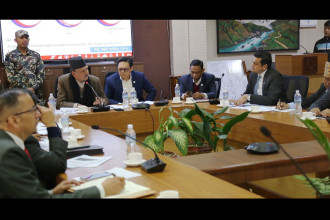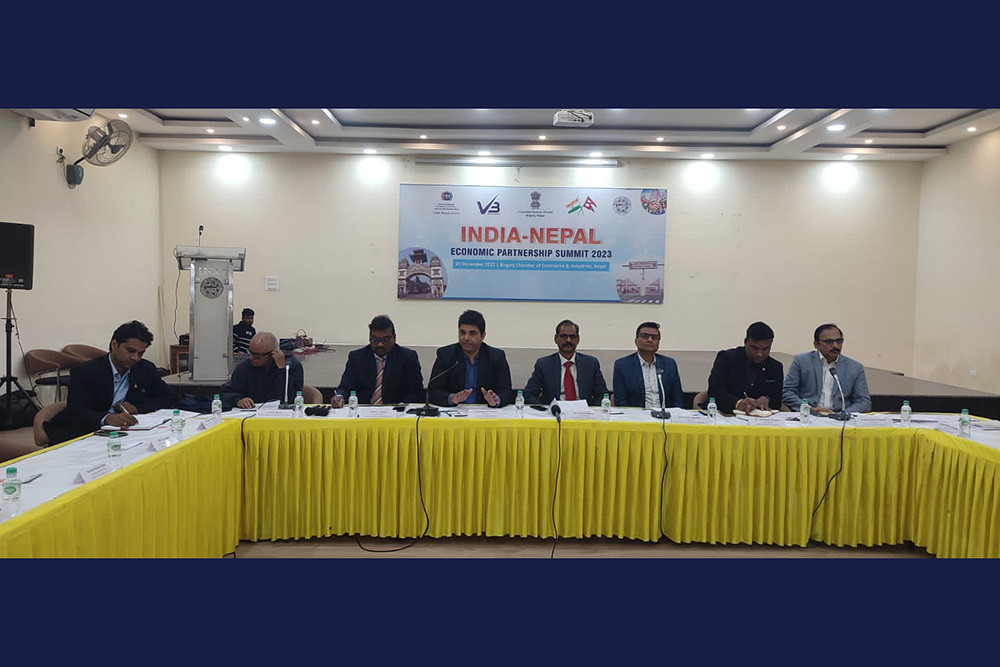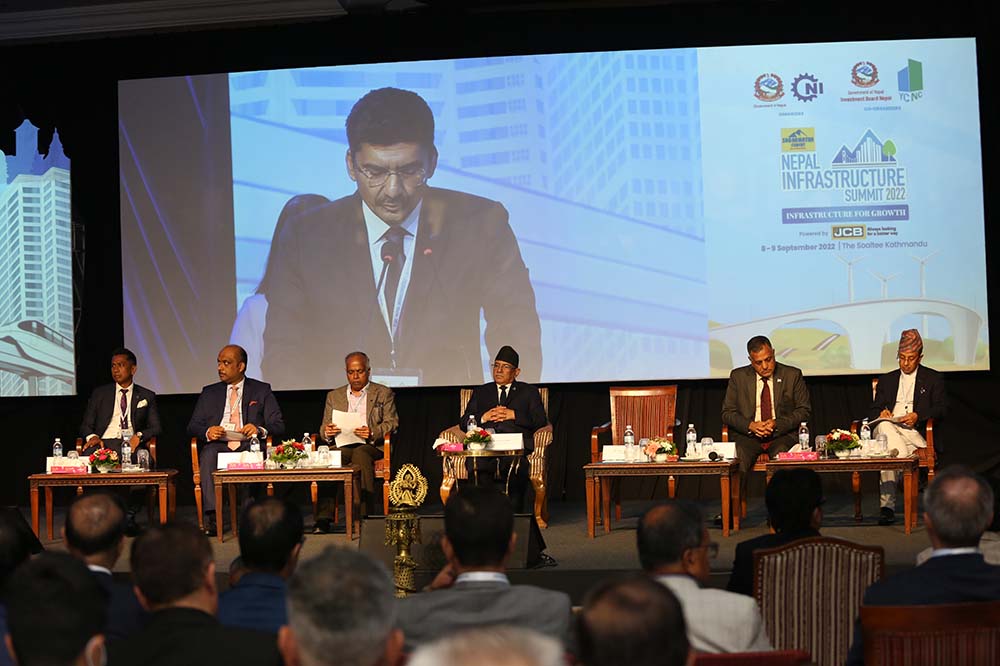
KATHMANDU: The opening plenary session of the Nepal Infrastructure Summit organised by the Confederation of Nepalese Industries (CNI), began with a welcome address by CNI President Vishnu Kumar Agarwal.
The CNI President welcomed all the distinguished guests and participants of the summit. He thanked all the partner organisations for their support in making the summit a grand success.
Agarwal mentioned that the fourth edition of the summit was a continuation of the past three editions with the first being held in 2014. He highlighted how the previous editions of the summit had provided momentum to bring in necessary changes to various policies for infrastructure development in the country. In the past editions, the focus was on establishing infrastructure bank and having more private public partnerships (PPPs). He stated that it was due to this emphasis of the past editions that the Nepal Infrastructure Bank was established in the country.
With this fourth edition of the summit, Nepal will get a new direction as per the theme of the summit, ‘Infrastructure for Growth’ in relation to infrastructure development in Nepal. Agarwal said that infrastructure is vital for the economic growth of any country because it touches all sectors. Not only does it improve the economic infrastructure growth, but also gives rise to employment generation within the nation. He also spoke about how infrastructure does not mean only physical projects like roads and bridges and the like but also Information and Communication Technology (ICT) and that is why the summit has included ICT as a major agenda and session in the summit.
During his speech, Agarwal emphasized how infrastructure development has a huge potential in Nepal. He stated that the CNI had in 2019 presented a paper to the government where it mentioned that infrastructure has a share of 8 to 9.54% to the gross domestic product of the nation. He mentioned that as per National Planning Commission, around $20 billion was required to further develop infrastructure in Nepal. Right now, the capital expenditure is less than 4% which is an obstacle to infrastructure development because without development expenditure increasing it is going to be difficult to develop infrastructure.
Agarwal further stressed that Nepal needs more investment in infrastructure and that getting investments is not very difficult provided we have the correct policies and regulations. He said that policies need to be changed to attract investment in infrastructure. He also spoke about how tourism has great potential in the country and that the development of Gautam Buddha International Airport and Pokhara International Airport were some major positives for the country as these have further enhanced the scope for tourism development. He also mentioned how Nepal needs to attract foreign travellers who visit India, Bhutan and Sri Lanka.
He also emphasized the need to develop rural road networks and the need for cold storage facilities. Cold storage facilities are necessary, he said, for the export of vegetables and fruits to other countries. However, transport and logistics costs need to be reduced so that domestic goods have a competitive advantage, he added. There is a need to develop more expressways to connect the major industrial cities of the country, he mentioned.
He cited the example of Rudrapur Industrial Estate in India on how PPPs can be best utilised to develop infrastructure in Nepal. He said that Nepal could learn and use that type of model for the growth of country. Agarwal further added that to develop infrastructure there needs to be a masterplan on how we go about doing our projects. He also harped on the need to award contracts of projects to companies that have a reliable track record of developing quality projects.
The other possibility that the country has is in the development of ICT, he said. He mentioned that ICT is a very good sector to earn more for the country. He said the government and private sector need to focus more on developing proper infrastructure and human resources for ICT. As today’s youths are more tech-oriented, it is time to set up more IT parks across the nation to attract the youths to IT.
Agarwal further mentioned how the fiscal budget is also a very important component for not only infrastructure growth but for overall economic growth. He stated that the budget had some very good policies but the problem lies in the implementation of those policies. He said that PPP and industrial estates need to be developed as per the budget announcement.
He said CNI has taken the initiative for fostering PPP and now the government needs to focus on the same. He requested the government to lay more emphasis on PPP. Agarwal also stressed the need for the government to attract more foreign direct investment (FDI). He also said the government could issue various types of bonds to attract more investments. The other important factor to attract more investment he stated was that the country needs to focus on its sovereign credit rating.
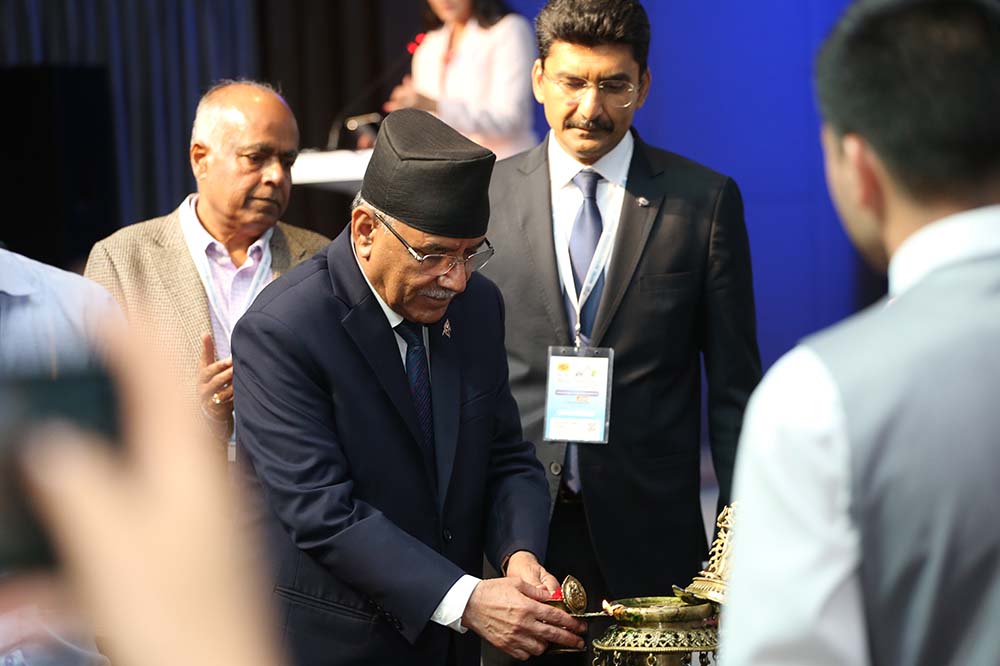 After Agarwal completed his welcome note, the summit was officially inaugurated by Chief Guest and former Prime Minister Pushpa Kamal Dahal. Dahal lit a butter lamp to officially launch the summit.
After Agarwal completed his welcome note, the summit was officially inaugurated by Chief Guest and former Prime Minister Pushpa Kamal Dahal. Dahal lit a butter lamp to officially launch the summit.
 The official inauguration was followed by a speech by Birendra Raj Pandey, Vice President of CNI. He highlighted various sessions that were to be conducted during the two-day summit. He also added that Nepal needs to focus on green and inclusive development. He mentioned that the entire world at the moment is facing problems due to the disruptions in the global supply chain and it has been hurting the macroeconomic indicators of not only Nepal but other nations too. However, despite the challenges, he stated that Nepal had been faring well.
Pandey added that infrastructure plays a vital role in the sustainable growth of the country and the fourth edition of the summit will lay emphasis on that particular fact. He also said that there is a need for more investment in infrastructure and that the private sector needs to be further encouraged to pour in more investment.
The official inauguration was followed by a speech by Birendra Raj Pandey, Vice President of CNI. He highlighted various sessions that were to be conducted during the two-day summit. He also added that Nepal needs to focus on green and inclusive development. He mentioned that the entire world at the moment is facing problems due to the disruptions in the global supply chain and it has been hurting the macroeconomic indicators of not only Nepal but other nations too. However, despite the challenges, he stated that Nepal had been faring well.
Pandey added that infrastructure plays a vital role in the sustainable growth of the country and the fourth edition of the summit will lay emphasis on that particular fact. He also said that there is a need for more investment in infrastructure and that the private sector needs to be further encouraged to pour in more investment.
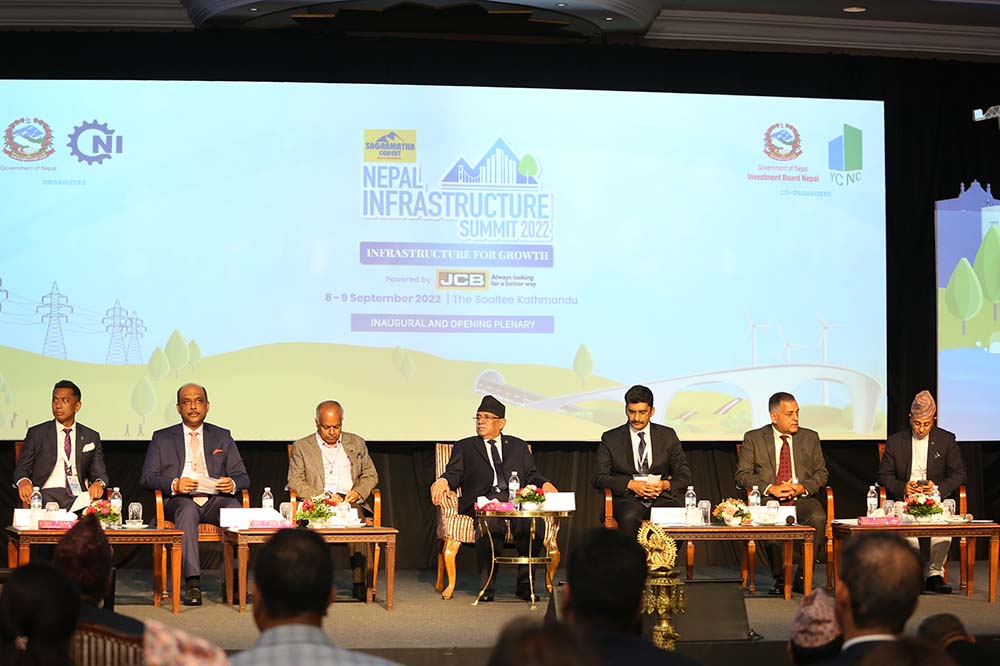 Meanwhile, Deepak Shetty, CEO and Managing Director of JCB India, while delivering his speech said that it was an honour to be a part of the summit which is of utmost significance for the development of infrastructure in Nepal. He said it was heartening to see that the 4th edition of the summit had been organized by CNI after a gap of a couple of years due to the Covid pandemic.
He mentioned that Nepal is rich in its natural beauty and cultural diversity and the country has so much to offer now the need was for infrastructure development for Nepal to realize its potential. He, however, said that the progress that Nepal has been making in relation to infrastructure development was noteworthy.
Shetty added that after the Covid pandemic, it is now the right time to focus on infrastructure development. He said it was nice to learn that Nepal had set an 8% economic growth target which shows that the government is committed to developing the country’s economy but he stressed that investment in infrastructure is a must. Hence, this summit is very important, he added. He further mentioned that with each sale of construction equipment, it generates employment for four to five people.
He also said that not only roads Nepal also needs to focus on airports and hydropower projects. It is good to see that the Arun III hydel project is being developed and roads are being expanded in Nepal, he stated. He also mentioned that it was encouraging to see that the summit had also focused on digital infrastructure as digital growth is the way forward in today’s world. For more growth, he said stable policies are a prerequisite.
Likewise, Ashok Lavasa, Vice President for Private Sector Operations and Public-Private Partnerships of Asian Development Bank, said it was a privilege to be a part of the summit which is crucial for Nepal. He lauded CNI for organizing the summit. He mentioned such summits were important for infrastructure growth and for economic growth. Like the theme of the event, infrastructure can create more economic stimulus than other sectors.
Similarly, Satish Kumar More, Immediate Past President, CNI, talked about the difficulties facing the infrastructure sector. He mentioned that proper policies play a defining role in economic growth, hence the government needs to focus on developing proper policies for infrastructure development which is the engine for growth. He mentioned that at the moment all political leaders and parties are focused on the upcoming elections but once the elections are over they need to be more focused on the economy. He said when healthy discussions are held regarding the economy then automatically it will bring more solutions to problems that the country has been facing in the previous years.
[gallery columns="1" size="full" link="file" ids="28607,28606"]
During his speech, Pushpa Kamal Dahal, Former Prime Minister thanked CNI for organising the summit as such summits add momentum to economic growth. He also stated that CNI inviting participants from other countries was also a positive aspect of the summit as it gives domestic players the opportunity to learn from their experiences.
He mentioned that people tend to doubt him when he speaks about the need for economic growth but he was committed to the economy of the country. Now that the country has achieved peace and the political situation is stable, he stated that it was time to focus on the economy. He accepted that the government had not been able to fulfil the aspirations of the private sector but he would do his best like how he has been doing in the past to forge a partnership with the private sector. He also stated that the government has to partner with the private sector if the country wanted to achieve prosperity.
Meanwhile, Deepak Shetty, CEO and Managing Director of JCB India, while delivering his speech said that it was an honour to be a part of the summit which is of utmost significance for the development of infrastructure in Nepal. He said it was heartening to see that the 4th edition of the summit had been organized by CNI after a gap of a couple of years due to the Covid pandemic.
He mentioned that Nepal is rich in its natural beauty and cultural diversity and the country has so much to offer now the need was for infrastructure development for Nepal to realize its potential. He, however, said that the progress that Nepal has been making in relation to infrastructure development was noteworthy.
Shetty added that after the Covid pandemic, it is now the right time to focus on infrastructure development. He said it was nice to learn that Nepal had set an 8% economic growth target which shows that the government is committed to developing the country’s economy but he stressed that investment in infrastructure is a must. Hence, this summit is very important, he added. He further mentioned that with each sale of construction equipment, it generates employment for four to five people.
He also said that not only roads Nepal also needs to focus on airports and hydropower projects. It is good to see that the Arun III hydel project is being developed and roads are being expanded in Nepal, he stated. He also mentioned that it was encouraging to see that the summit had also focused on digital infrastructure as digital growth is the way forward in today’s world. For more growth, he said stable policies are a prerequisite.
Likewise, Ashok Lavasa, Vice President for Private Sector Operations and Public-Private Partnerships of Asian Development Bank, said it was a privilege to be a part of the summit which is crucial for Nepal. He lauded CNI for organizing the summit. He mentioned such summits were important for infrastructure growth and for economic growth. Like the theme of the event, infrastructure can create more economic stimulus than other sectors.
Similarly, Satish Kumar More, Immediate Past President, CNI, talked about the difficulties facing the infrastructure sector. He mentioned that proper policies play a defining role in economic growth, hence the government needs to focus on developing proper policies for infrastructure development which is the engine for growth. He mentioned that at the moment all political leaders and parties are focused on the upcoming elections but once the elections are over they need to be more focused on the economy. He said when healthy discussions are held regarding the economy then automatically it will bring more solutions to problems that the country has been facing in the previous years.
[gallery columns="1" size="full" link="file" ids="28607,28606"]
During his speech, Pushpa Kamal Dahal, Former Prime Minister thanked CNI for organising the summit as such summits add momentum to economic growth. He also stated that CNI inviting participants from other countries was also a positive aspect of the summit as it gives domestic players the opportunity to learn from their experiences.
He mentioned that people tend to doubt him when he speaks about the need for economic growth but he was committed to the economy of the country. Now that the country has achieved peace and the political situation is stable, he stated that it was time to focus on the economy. He accepted that the government had not been able to fulfil the aspirations of the private sector but he would do his best like how he has been doing in the past to forge a partnership with the private sector. He also stated that the government has to partner with the private sector if the country wanted to achieve prosperity.
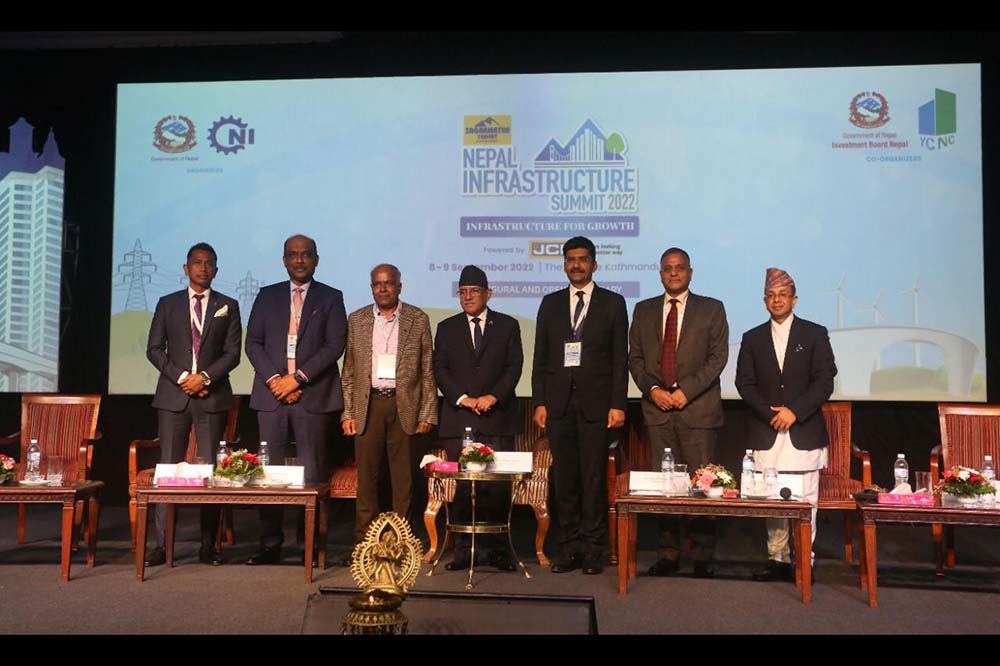 The plenary session concluded with Sushil Kumar Shrestha, President, YCNC, giving a vote of thanks.
READ ALSO:
The plenary session concluded with Sushil Kumar Shrestha, President, YCNC, giving a vote of thanks.
READ ALSO:
 After Agarwal completed his welcome note, the summit was officially inaugurated by Chief Guest and former Prime Minister Pushpa Kamal Dahal. Dahal lit a butter lamp to officially launch the summit.
After Agarwal completed his welcome note, the summit was officially inaugurated by Chief Guest and former Prime Minister Pushpa Kamal Dahal. Dahal lit a butter lamp to officially launch the summit.
 The official inauguration was followed by a speech by Birendra Raj Pandey, Vice President of CNI. He highlighted various sessions that were to be conducted during the two-day summit. He also added that Nepal needs to focus on green and inclusive development. He mentioned that the entire world at the moment is facing problems due to the disruptions in the global supply chain and it has been hurting the macroeconomic indicators of not only Nepal but other nations too. However, despite the challenges, he stated that Nepal had been faring well.
Pandey added that infrastructure plays a vital role in the sustainable growth of the country and the fourth edition of the summit will lay emphasis on that particular fact. He also said that there is a need for more investment in infrastructure and that the private sector needs to be further encouraged to pour in more investment.
The official inauguration was followed by a speech by Birendra Raj Pandey, Vice President of CNI. He highlighted various sessions that were to be conducted during the two-day summit. He also added that Nepal needs to focus on green and inclusive development. He mentioned that the entire world at the moment is facing problems due to the disruptions in the global supply chain and it has been hurting the macroeconomic indicators of not only Nepal but other nations too. However, despite the challenges, he stated that Nepal had been faring well.
Pandey added that infrastructure plays a vital role in the sustainable growth of the country and the fourth edition of the summit will lay emphasis on that particular fact. He also said that there is a need for more investment in infrastructure and that the private sector needs to be further encouraged to pour in more investment.
 Meanwhile, Deepak Shetty, CEO and Managing Director of JCB India, while delivering his speech said that it was an honour to be a part of the summit which is of utmost significance for the development of infrastructure in Nepal. He said it was heartening to see that the 4th edition of the summit had been organized by CNI after a gap of a couple of years due to the Covid pandemic.
He mentioned that Nepal is rich in its natural beauty and cultural diversity and the country has so much to offer now the need was for infrastructure development for Nepal to realize its potential. He, however, said that the progress that Nepal has been making in relation to infrastructure development was noteworthy.
Shetty added that after the Covid pandemic, it is now the right time to focus on infrastructure development. He said it was nice to learn that Nepal had set an 8% economic growth target which shows that the government is committed to developing the country’s economy but he stressed that investment in infrastructure is a must. Hence, this summit is very important, he added. He further mentioned that with each sale of construction equipment, it generates employment for four to five people.
He also said that not only roads Nepal also needs to focus on airports and hydropower projects. It is good to see that the Arun III hydel project is being developed and roads are being expanded in Nepal, he stated. He also mentioned that it was encouraging to see that the summit had also focused on digital infrastructure as digital growth is the way forward in today’s world. For more growth, he said stable policies are a prerequisite.
Likewise, Ashok Lavasa, Vice President for Private Sector Operations and Public-Private Partnerships of Asian Development Bank, said it was a privilege to be a part of the summit which is crucial for Nepal. He lauded CNI for organizing the summit. He mentioned such summits were important for infrastructure growth and for economic growth. Like the theme of the event, infrastructure can create more economic stimulus than other sectors.
Similarly, Satish Kumar More, Immediate Past President, CNI, talked about the difficulties facing the infrastructure sector. He mentioned that proper policies play a defining role in economic growth, hence the government needs to focus on developing proper policies for infrastructure development which is the engine for growth. He mentioned that at the moment all political leaders and parties are focused on the upcoming elections but once the elections are over they need to be more focused on the economy. He said when healthy discussions are held regarding the economy then automatically it will bring more solutions to problems that the country has been facing in the previous years.
[gallery columns="1" size="full" link="file" ids="28607,28606"]
During his speech, Pushpa Kamal Dahal, Former Prime Minister thanked CNI for organising the summit as such summits add momentum to economic growth. He also stated that CNI inviting participants from other countries was also a positive aspect of the summit as it gives domestic players the opportunity to learn from their experiences.
He mentioned that people tend to doubt him when he speaks about the need for economic growth but he was committed to the economy of the country. Now that the country has achieved peace and the political situation is stable, he stated that it was time to focus on the economy. He accepted that the government had not been able to fulfil the aspirations of the private sector but he would do his best like how he has been doing in the past to forge a partnership with the private sector. He also stated that the government has to partner with the private sector if the country wanted to achieve prosperity.
Meanwhile, Deepak Shetty, CEO and Managing Director of JCB India, while delivering his speech said that it was an honour to be a part of the summit which is of utmost significance for the development of infrastructure in Nepal. He said it was heartening to see that the 4th edition of the summit had been organized by CNI after a gap of a couple of years due to the Covid pandemic.
He mentioned that Nepal is rich in its natural beauty and cultural diversity and the country has so much to offer now the need was for infrastructure development for Nepal to realize its potential. He, however, said that the progress that Nepal has been making in relation to infrastructure development was noteworthy.
Shetty added that after the Covid pandemic, it is now the right time to focus on infrastructure development. He said it was nice to learn that Nepal had set an 8% economic growth target which shows that the government is committed to developing the country’s economy but he stressed that investment in infrastructure is a must. Hence, this summit is very important, he added. He further mentioned that with each sale of construction equipment, it generates employment for four to five people.
He also said that not only roads Nepal also needs to focus on airports and hydropower projects. It is good to see that the Arun III hydel project is being developed and roads are being expanded in Nepal, he stated. He also mentioned that it was encouraging to see that the summit had also focused on digital infrastructure as digital growth is the way forward in today’s world. For more growth, he said stable policies are a prerequisite.
Likewise, Ashok Lavasa, Vice President for Private Sector Operations and Public-Private Partnerships of Asian Development Bank, said it was a privilege to be a part of the summit which is crucial for Nepal. He lauded CNI for organizing the summit. He mentioned such summits were important for infrastructure growth and for economic growth. Like the theme of the event, infrastructure can create more economic stimulus than other sectors.
Similarly, Satish Kumar More, Immediate Past President, CNI, talked about the difficulties facing the infrastructure sector. He mentioned that proper policies play a defining role in economic growth, hence the government needs to focus on developing proper policies for infrastructure development which is the engine for growth. He mentioned that at the moment all political leaders and parties are focused on the upcoming elections but once the elections are over they need to be more focused on the economy. He said when healthy discussions are held regarding the economy then automatically it will bring more solutions to problems that the country has been facing in the previous years.
[gallery columns="1" size="full" link="file" ids="28607,28606"]
During his speech, Pushpa Kamal Dahal, Former Prime Minister thanked CNI for organising the summit as such summits add momentum to economic growth. He also stated that CNI inviting participants from other countries was also a positive aspect of the summit as it gives domestic players the opportunity to learn from their experiences.
He mentioned that people tend to doubt him when he speaks about the need for economic growth but he was committed to the economy of the country. Now that the country has achieved peace and the political situation is stable, he stated that it was time to focus on the economy. He accepted that the government had not been able to fulfil the aspirations of the private sector but he would do his best like how he has been doing in the past to forge a partnership with the private sector. He also stated that the government has to partner with the private sector if the country wanted to achieve prosperity.
 The plenary session concluded with Sushil Kumar Shrestha, President, YCNC, giving a vote of thanks.
READ ALSO:
The plenary session concluded with Sushil Kumar Shrestha, President, YCNC, giving a vote of thanks.
READ ALSO:
- Experts emphasize production of skilled manpower in IT field
- ‘Regional air connectivity, energy, tourism sectors have potential for economic empowerment’
- Experts stress policy reform to bring private investment to infrastructure development
- CNI to organise 3rd Nepal Infrastructure Summit in September
- CNI welcomes govt announcement to observe ‘domestic production decade’
Published Date: September 9, 2022, 12:00 am
Post Comment
E-Magazine
RELATED B360 National


